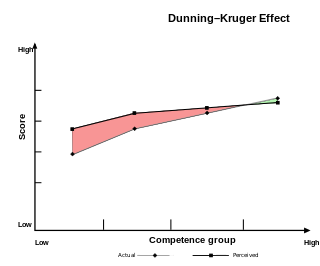Related Research Articles
Cognitive psychology is the scientific study of mental processes such as attention, language use, memory, perception, problem solving, creativity, and reasoning.
Social psychology is the scientific study of how thoughts, feelings, and behaviors are influenced by the actual, imagined, or implied presence of others. Social psychologists typically explain human behavior as a result of the relationship between mental states and social situations, studying the social conditions under which thoughts, feelings, and behaviors occur, and how these variables influence social interactions.
In the field of psychology, cognitive dissonance is the perception of contradictory information and the mental toll of it. Relevant items of information include a person's actions, feelings, ideas, beliefs, values, and things in the environment. Cognitive dissonance is typically experienced as psychological stress when persons participate in an action that goes against one or more of those things. According to this theory, when two actions or ideas are not psychologically consistent with each other, people do all in their power to change them until they become consistent. The discomfort is triggered by the person's belief clashing with new information perceived, wherein the individual tries to find a way to resolve the contradiction to reduce their discomfort.
Ignorance is a lack of knowledge or understanding. Deliberate ignorance is a culturally-induced phenomenon, the study of which is called agnotology.

Thomas Dashiff Gilovich an American psychologist who is the Irene Blecker Rosenfeld Professor of Psychology at Cornell University. He has conducted research in social psychology, decision making, behavioral economics, and has written popular books on these subjects. Gilovich has collaborated with Daniel Kahneman, Richard Nisbett, Lee Ross and Amos Tversky. His articles in peer-reviewed journals on subjects such as cognitive biases have been widely cited. In addition, Gilovich has been quoted in the media on subjects ranging from the effect of purchases on happiness to people's most common regrets, to perceptions of people and social groups. Gilovich is a fellow of the Committee for Skeptical Inquiry.
Depressive realism is the hypothesis developed by Lauren Alloy and Lyn Yvonne Abramson that depressed individuals make more realistic inferences than non-depressed individuals. Although depressed individuals are thought to have a negative cognitive bias that results in recurrent, negative automatic thoughts, maladaptive behaviors, and dysfunctional world beliefs, depressive realism argues not only that this negativity may reflect a more accurate appraisal of the world but also that non-depressed individuals' appraisals are positively biased.

The Dunning–Kruger effect is a cognitive bias in which people with limited competence in a particular domain overestimate their abilities. Some researchers also include the opposite effect for high performers: their tendency to underestimate their skills. In popular culture, the Dunning–Kruger effect is often misunderstood as a claim about general overconfidence of people with low intelligence instead of specific overconfidence of people unskilled at a particular task.
The overconfidence effect is a well-established bias in which a person's subjective confidence in their judgments is reliably greater than the objective accuracy of those judgments, especially when confidence is relatively high. Overconfidence is one example of a miscalibration of subjective probabilities. Throughout the research literature, overconfidence has been defined in three distinct ways: (1) overestimation of one's actual performance; (2) overplacement of one's performance relative to others; and (3) overprecision in expressing unwarranted certainty in the accuracy of one's beliefs.

Claude Mason Steele is a social psychologist and emeritus professor at Stanford University, where he is the I. James Quillen Endowed Dean, Emeritus at the Stanford University Graduate School of Education, and Lucie Stern Professor in the Social Sciences, Emeritus.
The illusion of asymmetric insight is a cognitive bias whereby people perceive their knowledge of others to surpass other people's knowledge of them. This bias "has been traced to people's tendency to view their own spontaneous or off-the-cuff responses to others' questions as relatively unrevealing even though they view others' similar responses as meaningful".
Brain training is a program of regular activities purported to maintain or improve one's cognitive abilities. The phrase “cognitive ability” usually refers to components of fluid intelligence such as executive function and working memory. Cognitive training reflects a hypothesis that cognitive abilities can be maintained or improved by exercising the brain, analogous to the way physical fitness is improved by exercising the body. Cognitive training activities can take place in numerous modalities such as cardiovascular fitness training, playing online games or completing cognitive tasks in alignment with a training regimen, playing video games that require visuospatial reasoning, and engaging in novel activities such as dance, art, and music.
A cognitive module in cognitive psychology is a specialized tool or sub-unit that can be used by other parts to resolve cognitive tasks. It is used in theories of the modularity of mind and the closely related society of mind theory and was developed by Jerry Fodor. It became better known throughout cognitive psychology by means of his book, The Modularity of Mind (1983). The nine aspects he lists that make up a mental module are domain specificity, mandatory operation, limited central accessibility, fast processing, informational encapsulation, "shallow" outputs, fixed neural architecture, characteristic and specific breakdown patterns, and characteristic ontogenetic pace and sequencing. Not all of these are necessary for the unit to be considered a module, but they serve as general parameters.
In social psychology, illusory superiority is a cognitive bias wherein a person overestimates their own qualities and abilities compared to other people. Illusory superiority is one of many positive illusions, relating to the self, that are evident in the study of intelligence, the effective performance of tasks and tests, and the possession of desirable personal characteristics and personality traits. Overestimation of abilities compared to an objective measure is known as the overconfidence effect.
The Stanford marshmallow experiment was a study on delayed gratification in 1972 led by psychologist Walter Mischel, a professor at Stanford University In this study, a child was offered a choice between one small but immediate reward, or two small rewards if they waited for a period of time. During this time, the researcher left the child in a room with a single marshmallow for about 15 minutes and then returned. If they did not eat the marshmallow, the reward was either another marshmallow or pretzel stick, depending on the child's preference. In follow-up studies, the researchers found that children who were able to wait longer for the preferred rewards tended to have better life outcomes, as measured by SAT scores, educational attainment, body mass index (BMI), and other life measures. A replication attempt with a sample from a more diverse population, over 10 times larger than the original study, showed only half the effect of the original study. The replication suggested that economic background, rather than willpower, explained the other half. The predictive power of the marshmallow test was challenged in a 2020 study.
The frog pond effect is the theory that individuals evaluate themselves as worse than they actually are when in a group of higher-performing individuals. This effect is a part of the wider social comparison theory. It relates to how individuals evaluate themselves based on comparisons to other people around them, and is generally due to upward comparisons toward people who are better than themselves.

Stephanie Fryberg is a Tulalip psychologist who received her Master's and Doctorate degrees from Stanford University, where in 2011 she was inducted into the Multicultural Hall of Fame. In the same year, she testified before Senate on Stolen Identities: The impact of racist stereotypes on Indigenous people. She previously taught psychology at the University of Arizona, at the Tulalip Community at Marysville School, and at the University of Washington. She currently teaches American Indian Studies and Psychology at the University of Michigan, and is a member of the Tulalip Tribe. Her research focuses on race, class, and culture in relation to ones psychological development and mental health. She translated Carol Dweck's growth mindset; taking a communal-oriented approach. The students on her tribe's reservation who received her translation had significant improvement compared to the original version.
Justin S. Kruger is an American social psychologist and professor at New York University Stern School of Business.
Emily E. Balcetis is an American social psychologist and Associate Professor of Psychology at New York University. Her research focuses on people's perception of world and how their motivations, goals, and emotions influence it, especially with regards to visual perception.
The liking gap is the disparity between how much a person believes that another person likes them, and that other person's actual opinion. Studies have found that most people underestimate how much other people like them and enjoy their company.
References
- 1 2 "David Dunning". University of Michigan. Retrieved June 6, 2016.
- 1 2 "David Dunning". Cornell University Institute for the Social Sciences. Archived from the original on May 2, 2019. Retrieved May 25, 2016.
- ↑ Dunning, David Alan (1986). Situational construal and sources of social judgment (Ph.D. thesis). Stanford University.
- ↑ Kruger, J; Dunning, D (December 1999). "Unskilled and unaware of it: how difficulties in recognizing one's own incompetence lead to inflated self-assessments". Journal of Personality and Social Psychology. 77 (6): 1121–34. CiteSeerX 10.1.1.64.2655 . doi:10.1037/0022-3514.77.6.1121. PMID 10626367.
- ↑ Abrahams, Marc (December 2005). "Those Who Can't, Don't Know It". Harvard Business Review. Retrieved May 25, 2016.
- ↑ Morris, Errol (June 20, 2010). "The Anosognosic's Dilemma: Something's Wrong but You'll Never Know What It Is (Part 1)". The New York Times . Archived from the original on August 27, 2022. Retrieved October 16, 2022.
- 1 2 Lee, Chris (May 25, 2012). "Revisiting why incompetents think they're awesome". Ars Technica. Retrieved May 25, 2016.
- ↑ Stafford, Tom (November 25, 2013). "The more inept you are the smarter you think you are". BBC Future. Retrieved May 25, 2016.
- ↑ "Stanford University Names World's Top 2% Scientists, 2021 | U-M LSA Department of Psychology". lsa.umich.edu. Retrieved May 15, 2022.
- ↑ Jeroen Baas (October 19, 2021), August 2021 data-update for "Updated science-wide author databases of standardized citation indicators", vol. 3, John P.A. Ioannidis, Kevin Boyack, Jeroen Baas, Elsevier BV, doi:10.17632/btchxktzyw.3 , retrieved May 15, 2022